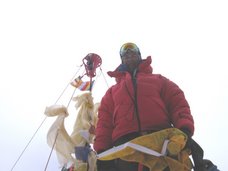
After leaving the mountain and a day of recovery at 9,000 ft., Scott felt back to full-strength, other than the disappointment that he had to abandon the climb, and then he had a week to explore other areas of Argentina.
Below is a picture from the summit of San Bernardo and a couple photos from the approach to Aconcagua.
He spent 3 days in the small resort town of Malagrue checking out a lagoon, Las Lenas - a ski area, some volcanoes, and a cool cave where he did some spelunking.
(photo of cache drop at Camp II- 17,700 ft. )
Then he headed to the Cordon del Plata mountain range near the Andes hoping to get good views of Aconcagua. He made it to the summit of San Bernardo Peak (13,500 ft.), but unfortunately the weather did not provide a clear view of the "Big A." While camping in this area, there were some vicious storms (hail, thunder and lightning). Later we found out that this same storm resulted in a blinding snowstorm and an avalanche on Aconcagua. If Scott's original schedule had gone as planned, this would have been the time that Scott would have been descending from the summit of Aconcagua and could have been caught in this storm. In hindsight, it's a blessing that he was camped out in a different mountain range an hour away at 10,200 ft. rather than at 19,000 ft. on Aconcagua.
Below is a picture from the summit of San Bernardo and a couple photos from the approach to Aconcagua.
The rest of his pictures from the trip can be found on http://www.mountainwaz.shutterfly.com/






